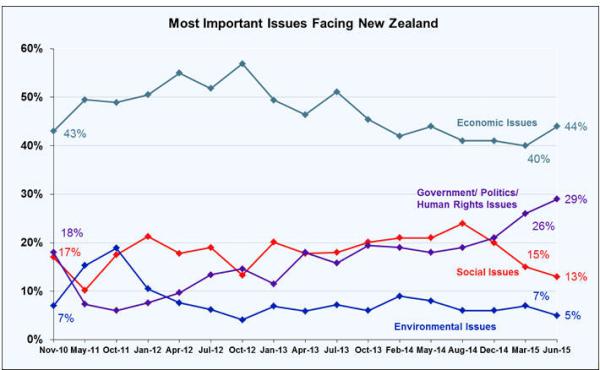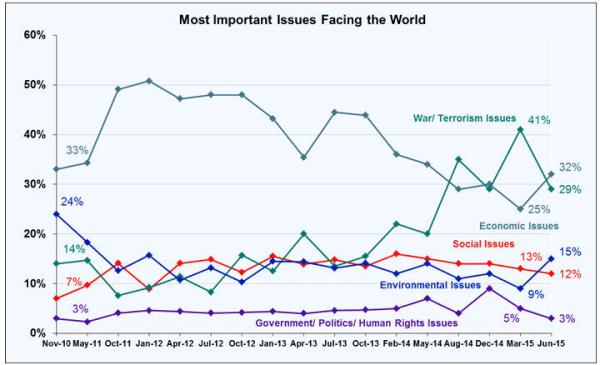Friday, 10 July 2015
Kiwis
view Economic issues (44%) as the biggest problems facing
NZ; Housing shortage/ Housing affordability up again to
record high 14% in
June
In June 2015,
Economic issues 44% (up 4% since March
2015) are still clearly the most important problems facing
New Zealand and the biggest problems facing
the World today are once again
Economic Issues 32% (up 7%) according to
the latest Roy Morgan Research conducted in June
2015.
New Zealand views on Problems facing New
Zealand
When asked about
the most important problem facing New
Zealand, 44% of New Zealanders mention some kind of
Economic issue. This is up 4% from March 2015 and well ahead
of Government/ Public policy/ Human rights issues 29% (up
3%), Social issues 13% (down 2%) and Environmental issues 5%
(down 2%).
The most important Economic issues facing New Zealand include Poverty / The gap between the rich and the poor 21% (up 3%), Economy/ Financial crisis/ Recession/ Exchange rate/ High dollar 10% (up 5%), Unemployment/ Job security 5% (down 3%) and Cost of living/ Inflation/ Financial hardship/ Household debt 4% (down 1%).
There has also been a significant increase in New Zealanders mentioning Housing shortage/ Housing affordability 14% (up 4%) as a problem facing New Zealand – this is at a new record high, while other important issues include Government/ Politicians/ Leadership/ Government spending 8% (down 1%), Social apathy/ Lack of values/ Lack of empathy/ Intolerance 3% (unchanged) and Child abuse 3% (unchanged).

New Zealand views on
Problems facing the
World
The biggest
World problems are now Economic issues 32%
(up 7% since March 2015) followed by War & Terrorism/
Security (29%, down a large 12%) and both are well ahead of
Environmental Issues 15% (up 6%) and Social Issues 12% (down
1%).
Of the Economic issues facing the World mentioned by New Zealanders the most important are Poverty/ The gap between rich & poor/ Imbalance of wealth 19% (up 5%), Economy/ Financial crisis/ Recession 4% (up 1%), Cost of living/ Inflation/ Financial hardship/ Household debt 3% (unchanged) and Over-population 3% (up 1%).
Among the War & Terrorism/ Security issues facing the World mentioned by New Zealanders are Wars and Conflicts/ Unrest 12% (unchanged), Terrorism 11% (down a large 12%), and Religious Conflict 4% (up 1%).
Other important issues are Climate change/ Global warming/ Ozone layer/ Greenhouse effect 8% (up 3%), Social apathy/ Lack of values/ Lack of empathy towards others/ Intolerance 5% (unchanged), Greed 4% (up 1%) and Famine/ Hunger/ Starvation 3% (up 1%).

Michele Levine, Chief Executive Officer, Roy Morgan says:
“Economic issues dominate in New Zealand – 44% (up 4% since March 2015) of New Zealanders say the biggest problems facing New Zealand are economic and 32% (up 7%) say economic issues are also the biggest problems facing the World. These results are similar to those recorded across the Tasman in Australia where 49% of Australians in April mentioned Economic issues as the biggest problem facing Australia > and 27% mentioned Economic issues as the biggest problem facing the World alongside Terrorism/ Wars/ Security issues (also 27%).“In New Zealand the biggest economic issue is Poverty/ The gap between the rich and the poor/ Imbalance of wealth 21% (up 3%) followed by Economy/ Financial crisis/ Recession/ High dollar 10% (up 5%), Unemployment/ Job security 5% (down 3%) – clearly lower than across the Tasman in Australia (13%), and Cost of living/ Inflation/ Financial hardship/ Household debt 4% (down 1%).
“Housing shortage/ Housing affordability 14% (up 4%) is a huge problem facing New Zealand – now at a record high. The soaring housing prices in Auckland are the largest driver of this issue which is most prominent amongst Auckland respondents (21%) and also younger New Zealanders – 18% of 14-24yr olds. Many Kiwis also view Government/ Politicians/ Leadership/ Government spending 8% (down 1%) as a significant problem. These issues are part of the Government/ Public policy/ Human rights issues now at a total of 29% (up 3%).
“The biggest economic issues facing the World are Poverty/ The gap between the rich & poor/ Imbalance of wealth 19% (up 5%) and Economy/ Financial crisis/ Recession 4% (up 1%). War/ Terrorism & Security issues have fallen back to 29% (down 12%) after spiking early in 2015 following the atrocities in France – the two most mentioned sub-issues are Wars & Conflicts 12% (unchanged) and Terrorism 11% (down 12%).
“Environmental issues have jumped to 15% (up 6%) in June – the highest this set of issues has been for more than 2 ½ years since January 2013. Clearly the most important environmental issue New Zealanders mention is Climate Change/ Global Warming/ Greenhouse effect 8% (up 3%) – a record high for this problem since Roy Morgan first asked this question in 2010. Later this year a gathering of world leaders in Paris will discuss the issue at the Intergovernmental Panel on Climate Change (IPCC) Conference – the follow-up to the Copenhagen Conference in 2009.”
These findings come
from a special New Zealand Roy Morgan survey conducted with
New Zealanders aged 14+ asked what are the most important
issues facing New Zealand and the
World today.
In New Zealand, a
cross-section of 1,000 men and women aged 14 or over were
interviewed by telephone in June 2015. Respondents were
asked: “Firstly, what do you think is the most
important problem facing the World today?” and
“What do you think is the most important problem facing
New Zealand today?” The research conducted was both
qualitative (in that people were asked to
use their own words) and quantitative (in
that the ‘open-ended’ responses were analysed and
‘coded’ so that the results could be counted and
reported as
percentages).
Roy
Morgan New Zealand Electorate
Profiles
Roy Morgan New
Zealand provides the most in-depth analysis of each New
Zealand electorate with our New Zealand Electorate profiles.
Each electorate profile answers the key questions about the
electorate. Who are the electors? What are they thinking?
What media do they use? Who are they voting for? What are
they doing? View a sample Roy Morgan New Zealand Electorate
Profile here.
Margin of Error
The margin of error to be allowed for in any estimate depends mainly on the number of interviews on which it is based. The following table gives indications of the likely range within which estimates would be 95% likely to fall, expressed as the number of percentage points above or below the actual estimate. The figures are approximate and for general guidance only, and assume a simple random sample. Allowance for design effects (such as stratification and weighting) should be made as appropriate.





 Keith Rankin: Who, Neither Politician Nor Monarch, Executed 100,000 Civilians In A Single Night?
Keith Rankin: Who, Neither Politician Nor Monarch, Executed 100,000 Civilians In A Single Night? Eugene Doyle: Writing In The Time Of Genocide
Eugene Doyle: Writing In The Time Of Genocide Gordon Campbell: On Wealth Taxes And Capital Flight
Gordon Campbell: On Wealth Taxes And Capital Flight Ian Powell: Why New Zealand Should Recognise Palestine
Ian Powell: Why New Zealand Should Recognise Palestine Binoy Kampmark: Squabbling Siblings - India, Pakistan And Operation Sindoor
Binoy Kampmark: Squabbling Siblings - India, Pakistan And Operation Sindoor Gordon Campbell: On Budget 2025
Gordon Campbell: On Budget 2025